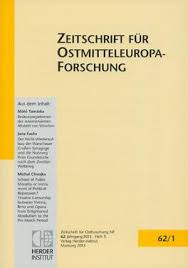Patentrecht im spät- und postkommunistischen Ostmittel- und Osteuropa. Nationale, regionale und globale Transformationsprozesse des Schutzes geistigen Eigentums von den 1970er Jahren bis heute
Patent Law in Late- and Post-Communist East Central and Eastern Europe. National, Regional and Global Transformation Processes in the Protection of Intellectual Property from the 1970s till Today
Author(s): Cindy Daase, Hannes Siegrist Subject(s): Civil Law, Post-War period (1950 - 1989), Transformation Period (1990 - 2010), Present Times (2010 - today), Post-Communist Transformation
Published by: Verlag Herder-Institut
Keywords: Patent Law; Post-Communist East Central and Eastern Europe; Transformation Processes; Protection of Intellectual Property; 1970s till Today;
Summary/Abstract: This article examines international, regional and national legalisation, institutionalisation and transformation processes in the area of patent law since the 1970s, and in particular since 1989/91. The authors seek to give both an overview of the rapidly changing global and European protection of patent rights as well as of national transfer and transformation processes taking the example of the Republic of Poland, Hungary and the Russian Federation. They raise the question of whether we witness processes of a vertical norm transfer from the global to the regional and national level, or whether we rather find a complex net of interconnected and interdependent transfer and transformation processes. Drawing on Laurence Helfer’s works on regime shifts, the authors investigate these developments and processes as examples of regime shifting in international, regional and national intellectual property and patent protection systems. The application and modification of this approach enables not only a description and analysis of the vertical transfer of norms and standards from the global to the regional and national level, but also of the interaction and repercussions between these spheres and systems. Thus, the transformation of patent protection in late- and post-communist East Central and Eastern Europe is presented as a web of complex and dynamic processes of legal integration, approximation, standard transfer and adaptation between the national, regional and global level. In the end, the authors point out that the task of social science and historical research on intellectual property rights and patent law is to analyse the situations, motives, objectives and goals of state and non-state actors in their social, political, economic, cultural and legal contexts and constellations. They come to the conclusion that regime shifting and legal pluralism are appropriate concepts for further investigations of the development of patent law in late and post-communist East Central and Eastern Europe.
Journal: Zeitschrift für Ostmitteleuropa-Forschung
- Issue Year: 61/2012
- Issue No: 3
- Page Range: 379-404
- Page Count: 26
- Language: German

